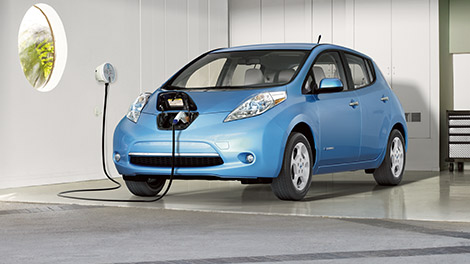The cost to charge an electric vehicle varies depending on the vehicle, local electricity rates, and driving habits, but on average, an electric vehicle driver will pay just 25–50% of what they would pay in a comparable gasoline vehicle.
To estimate your charging costs, visit PlugStar.com, enter your ZIP code, select your vehicle, and then click the Charging tab.
By Tom Moloughney – UPDATED November 2016
There are many reasons for considering making an electric car the next car you buy or lease. Besides the many environmental benefits, the promise of energy security, the silky-smooth driving experience with instant torque available without delay, and low maintenance, one of the best characteristics of electric vehicles is how little they cost to operate.
Just as with gasoline cars, some electric vehicles are more efficient than others, and the average EV needs about 30 kWh of electricity to power the vehicle for 100 miles. For example, the EPA rating for the Nissan LEAF is exactly 30 kWh per 100 miles. A Tesla Model S 60D is rated at a combined 32 kWh per 100 miles and uses a little more energy since it’s heavier and more powerful than a LEAF. The Chevrolet Bolt is currently the most efficient electric car and has a combined consumption rating of 28 kWh per 100 miles. The consumption for all electric vehicles can be viewed at the US Department of Energy’s website: www.fueleconomy.gov
According to Researchers at the University of Michigan Transportation Research Institute, the sales-weighted average fuel economy of all new vehicles sold in the United States in 2016 was 25.3 mpg. The average cost for a gallon of regular gasoline in the US over the past two years was $2.35/gallon. Using 15,000 miles as the average amount of miles a person will drive in a year, the annual cost of gasoline for the average car will be about $1,400 per year, using the average cost of gasoline in the US from 2015 through 2016. One thing to also consider is that the cost of gasoline is currently much lower than it has been through most the past decade and it’s likely to rise again sometime soon.
All of the electricity we use in America is domestically produced, and that’s a large part of why the cost remains stable. The average cost of electricity in the US is 12 cents per kWh. Therefore, the average person driving the average EV 15,000 miles per year pays about $540 per year, or $45 per month, to charge it.

Tesla Model S charging
The cost of electricity throughout the US varies much more than gasoline does, but its cost over time is much more stable. Unlike with gasoline, there aren’t huge spikes in electricity rates if a refinery has a problem, and neither does the price skyrocket when there is political instability in one of the large oil producing countries as we have often seen in the past. All of the electricity we use in America is domestically produced, and that’s a large part of why the cost remains stable. The average cost of electricity in the US is 12 cents per kWh. Therefore, the average person driving the average EV 15,000 miles per year pays about $540.00 per year to charge it. As mentioned, the cost of electricity can vary greatly depending on where you live, but in order to equal the price of the average gasoline car’s fuel costs, the price of electricity would have to be 2.5 times the national average, and cost 31 cents per kWh. The average person would save roughly $860 per year in fuel alone, and that’s assuming gasoline prices remain at their historically low current levels. Gasoline prices frequently spike up and down, but in the long run they always goes up. Electricity costs do eventually increase also, but not nearly at the pace of gasoline. Plus, with fewer moving parts, EVs cost much less to maintain. If you combine the fuel savings with the reduced maintenance costs, it’s clear to see an EV will cost you much less in the long run, even if it costs a little more up front.


